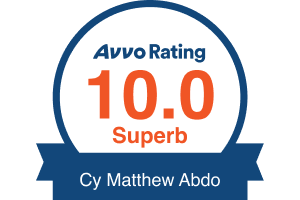ESTATE PLANNERS
Estate Planning, Elder Law and Probate
Macomb County’s Estate Planning and Elder Law Lawyers Since 1980
Estate planning is for everyone and everyone will need an estate plan sooner or later. Like many, you are constantly thinking about an estate plan but have not taken the first step. Do yourself a favor and don’t wait any longer.
Call now for free estate planning analysis
Phone: 586-412-5555
Why is ABDO LAW the right choice when you are ready to prepare an estate plan, need a power of attorney or the services of a Macomb County Probate Court lawyer? Because we know the family values and work ethics of the people this community. Macomb County is where we were raised, attended the public schools (Lakeview, Dakota, Eisenhower) and operate our law practice! Macomb County is a community with ethnic diversity and many of our Macomb County clients can trace their roots to Detroit’s Eastside neighborhoods with strong ties to the automotive industry.
Prepare an Estate Plan While You Are Healthy and of Sound Mind
Did you know that you may not be able to execute estate planning documents if in the opinion of your doctors, family or lawyer you are incapacitated or deemed incompetent? This is always an unfortunate scenario which leaves management of the estate in the control of the courts and distribution of the estate to unintended recipients.
Let ABDO LAW design an estate plan that’s a perfect fit for you and will give you peace of mind today and in the precious years to come.
What is an Estate Plan?
Your estate consists of all personal property, bank accounts, real estate and possessions that you have accumulated. An estate also consists of any property where any interest can be claimed, such as a pending lawsuit. Debts, liabilities and mortgage(s) also components in the estate of an individual or family.
An estate plan is a personal roadmap with advance directions and instructions for the management, administration, control and smooth transfer of your estate in the event of your disability death or other contingency.
Below is a list of the primary documents that go into an estate plan:
- Last Will and Testament
- Trust(s)
- Durable Power of Attorney
- Designation of Health Care Agent
- Other estate planning tools may include: deeds, jointly held property and life insurance to fund the estate, taxes or liabilities.
Description of Estate Planning Documents
Upon death, your designated trustee and personal representative will coordinate the administration of your estate to carry out your directives for the protection of your estate assets and beneficiaries. The goal is always to plan a smooth transition of your estate according to your wishes and avoid taxes, probate proceedings and court involvement. You do not need to lose a single penny of your estate if you have a solid estate plan. Below is an explanation of the most commonly used estate planning documents:
- Last Will and Testament: A last will and testament is a legal document which becomes effective upon death. The last will and testament names the intended beneficiaries (individuals or charities) of an estate, nominates a personal representative to manage the estate, nominates guardians for minor children and distributes the estate property according to specific directives. Specific gifts of property, such as jewelry or firearms, can also be made in a will. A will does not avoid probate.
- Trust: A comprehensive estate plan will involve a revocable living trust. Unlike a will, assets held in trust do not need to be probated. The initial cost of a trust is expensive but is a value in the long haul considering it has great flexibility, can avoid court proceedings and provide for the continuing management of businesses, financial and personal affairs under many circumstances. In addition, assets can be held in trust beyond death and be managed by the trustee for the protection of children or loved ones with special needs. The terms of a trust allow for assets to be protected from the reach of creditors and from impetuous spending by a beneficiary.
- Power of Attorney: A power of attorney is a legal document that grants authority to another person to act on another’s behalf in personal, financial and business affairs. A Power of Attorney may grant authority for a limited purpose or task, such as the sale of real estate, or contain a general and broad grant of authority to manage any and all affairs. A power of attorney is an excellent way to delegate authority and conduct business in matters that do not require the physical presence of the grantor. All estate planning documents, including a power of attorney, require the competency of the person executing the document.
- Health Care Power of Attorney: A health care power of attorney is a document which allows a person, or patient, to appoint an agent, or advocate, to make decisions regarding healthcare and life support options when the patient is incapable of making decisions on his or her own. A health care power of attorney is also referred to as a health care directive, patient advocate designation or health care proxy and is routinely prepared as a major component of an estate plan.
What if I Do Not Prepare an Estate Plan?
Each state has laws, known as intestate succession laws, which provide for the distribution of your estate in the event that you die without a valid will. The formula for distribution that is imposed by state law for those without an estate plan allows for distributions ONLY to family members related by blood and not to those outside of your family. Distribution according to state law does not adequately protect second marriage or extended family scenarios. We believe that you alone, not the government, should have the final say regarding the distribution of your estate.
Can I Leave Property to my Children After the Age of 18?
The answer is yes, you can leave property to your children after the age of 18. In Michigan and most other states, a child can receive an inheritance at age 18. Typically, this is against the wishes of most parents because children (at age 18) rarely have the experience and maturity to manage wealth. An estate plan allows you to designate that children receive an inheritance at a later age, or that the inheritance be paid at interval ages (age 21, 25, 30), while providing an allowance for education and other purposes in the interim.
Estate Planning is Crucial If You Become Disabled
People are living longer. However, there is no assurance that that living longer means that you will be able to live independently. A solid estate plan will cover you if you become physically or mentally unable to manage your banking, bills, investments, household and other personal and financial affairs. Ask your attorney how a living trust and durable power of attorney operate to accomplish the smooth and seamless continuation of your household, business and personal affairs.
Probate Proceedings
Probate refers to the court process for the administration of an estate. As we explain, probate proceedings are sometimes necessary when an estate is not set up to be privately distributed or there is a problem with the estate. If you find yourself in this position, consider ABDO LAW where we can keep you organized and professionally wind up the affairs of a loved one efficiently and for a flat fixed fee. Let us explain how we can get a court order within a few days after being retained to get assets transferred and keep the affairs of the deceased party up to date and in good order.
Put Estate Planning at the Top of Your “To Do” List
ABDO LAW will evaluate your circumstances and objectives to customize an estate plan that meets your needs at a flat fixed fee.
You can decide the best format that is suitable to get started with us by meeting in person, email or a ZOOM meeting.




















